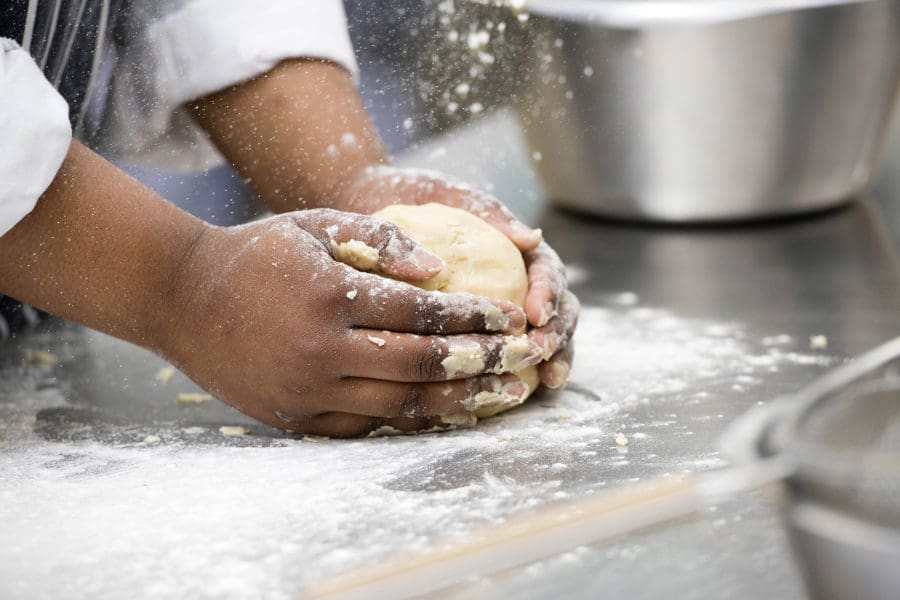Course overview
Production Chef Level 2 Apprenticeship City of Bristol CollegeThis course is for those aspiring to a career as a chef in a café, bar, care home or pub/restaurant setting who would prefer to learn in a work-based environment.
You may already be working in the sector or could be taking your first steps into your career.
Start Your Apprenticeship Journey with City of Bristol College
Start your apprenticeship journey with City of Bristol College
Additional information
Who is this course for?
This apprenticeship is available to young people aged 16-18 and adults aged 19 and over, who are committed to training and developing professionally while working within food production and cooking.
It is for individuals who are working within a professional kitchen and want to learn through a mainly work-based route. This could be a hotel, restaurant, hospital, care home or pub environment preparing and cooking food for customers.
You will need to secure an apprenticeship position with an employer or, if you are already employed in an appropriate role, your employer could choose to support your apprenticeship training by working with the college.
What you'll learn
You will continue to work in the kitchen while gaining further knowledge and skills and behaviours in your chosen area.
You will work with your college trainer in the workplace to gain the knowledge and skills to achieve your qualification
On this apprenticeship, you’ll learn the knowledge and skills required to become a production chef whilst working in the sector.
You will cover skills in cooking, working with people, food safety and business, and will use what you’ve learned from your workplace training to demonstrate your learning to an end-point assessor.
You will also work towards either a Functional Skills Level 1 qualification in English and Maths, or Level 2, if you don’t already have them.
Course entry requirements
You must be aged 16 years or over and must be working in the hospitality and catering sector for at least 30 hours a week. You also need to be a resident in England and not taking part in full-time education. You will be working in the industry, with relevant experience and skills.
Maths and English at GCSE grade 3 are a minimum entry requirement.
Apprentices must demonstrate a strong work ethic and a willingness to learn; be respectful and punctual; show a good grasp of health and safety; be prepared to work irregular hours and effective communication with colleagues, supervisors, and front-of-house colleagues.
How is the course delivered and assessed?
This apprenticeship is delivered entirely in the workplace.
To complete the apprenticeship, the employee/apprentice must pass Level 1 English and Maths (or have the appropriate exemption certificate) and work towards and attempt Level 2 before undertaking their end-point assessment.
Your College Trainer will meet with the apprentice regularly, either online or face to face, to complete and review assessments, provide further coaching where required and agree on the next steps of learning.
The apprentice will be assessed to the apprenticeship standard using four complementary assessment methods. The assessment is synoptic, i.e. takes a view of the overall performance of the apprentice in their job. The assessment activities will be completed by the independent end assessor as follows:
90-minute on-demand multiple choice test; Externally set and marked. Undertaken off-site.
Practical observation; 2 hour observation of the apprentice in the working environment. Time may be split to cover preparation and service. Shows apprentice covering a range of tasks in their kitchen.
Professional discussion. 40 minute structured meeting. Led by the independent end assessor, involving the apprentice and employer (e.g. line manager).
Apprentices need to complete 20% off-the-job training during the on-programme phase of their apprenticeship. Specific rules govern this and it must take place in the apprentice’s contracted hours. You can track and authorise the 20% through our e-portfolio
At the end of your learning on your apprenticeship you will undertake an end point assessment with an independent assessor, on successful completion of this you will gain your apprenticeship certificate
At the end of 12 months, you will have 3 months to complete end point assessments;
You will be assigned a work-based college trainer who will guide you through your apprenticeship in conjunction with your employer to help you pass this assessment and provide support and guidance.
You will use an e-learning portfolio to present your evidence for assessment.
Future career and study opportunities
When you complete this apprenticeship, your employer might be able to offer you a permanent position with the business.
Alternatively, you will be able to seek employment with a range of establishments where you could use your cooking skills, for example, in a café, pub or catering company.
Additional costs
As a City of Bristol College apprentice, you may incur additional costs on your apprenticeship. For example, you may likely need to pay for travel and stationery, and for some apprenticeships, you may need to purchase specialist equipment.
If you are on a limited income, you may be able to receive help from our Learner Support Funding Bursary.
-
Career Coach
For guidance on which career path to take, to explore career options related to our courses, find out which careers are in demand, and then get the training you need.















